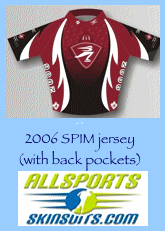 |  |  | ||||||||||||
Chuck Carlberg Interview: Part II Advice for First Time Marathoners Robert: Do you have any advice for first-time marathoners? Chuck: Get a hotel room early.(laughs) This race fills the city! We're a tourist area and we have a lot of beds in this town. But this fills the city. Robert: Do skaters need a certain level of skill to finish the race or at least have a good time? Chuck: If you could go out and skate an eight-mile loop, you would have a good probability of getting through our course very comfortably. It's gentle, rolling. It follows the northern edge of Lake Superior. It's very scenic. And you tend to get sucked along by the crowd both physically and with the adrenaline that's going on: you know, lots of people having fun. ... They should also know how to break. We do offer a free online training program on marationskating.com. If you punch in your race number, you get a free training program as well. Robert: The record for the NorthShore is 58 minutes and 17 seconds (set by Chad Hedrick in 1998). So what's the average time for finishing? Chuck: Oh, I'm going to tell you that the average is in the two-hour range. And that would be your average rec skater. Robert: Are entrants required to finish within a certain amount of time? Chuck: Four and a half hours. We start the race at 7:30 a.m. in the morning. If you don't finish by noon, you'll be picked up and removed from the course. ... It rarely happens, by the way. Most everybody finishes. Robert: How do you keep a race with 4,000 skaters from being chaotic and dangerous? Chuck: First of all, you have to earn your starting placement. We don't want faster skaters starting behind slower skaters trying to get through the crowd and knocking people down. Safety is our No. 1 concern. So based on that, we put the skaters out in waves. We have nine separate waves of skaters, and we have three minute gaps between them. ... It takes about half an hour to start all the waves. Robert: How do you know what wave to put everyone in? Chuck: When you register, you are asked to give us a record of your marathon experience or an estimated time of finish if it's your first marathon. ...We have to go by your estimate the first time. Robert: Do first-timers generally over- or underestimate how long it will take them? Chuck: They generally overestimate how long it will take. They tend to base it on their training time. But training is not a race. And people tend to just go with the crowd. People just get in a pace line and go. Robert: Have you ever skated the NorthShore? Chuck: No. It's an awful busy day for me. .. But I've been skating since 1985 and I've been keeping track of my mileage, and I'm probably in the neighborhood or twenty-two or twenty-three thousand miles. Robert: What do you see as the future of inline marathons? Chuck: I believe inline marathon skating is going to grow -- there's no question, though not necessarily in the size of the events but in the numbers of them. I get calls from cities ... oh, I betcha I get a call once or twice a month from cities in this country or Canada or whatever that are looking to accomplish what we have accomplished here in Duluth, Minnesota. And what they are realizing is that in a medium-sized city of 200,000 people or less, that a couple million dollar impact for a weekend means something! That might not make a big difference for New York or LA. But our city, anyhow, woke up and took notice and said, " That's a wonderful thing! You're filling every hotel room in town." That's our job: to put heads in bed and to show them a good time.
| Links: | |||||||||||||||||
| ||||||||||||||||||
 | ||||||||||||||||||
... Copyright © 2006 by Robert Burnson | ||||||||||||||||||
Planet Extras!
• Beginner's Guide to Outdoor Racing
• 10 Ways to Avoid Getting Hit by Cars
• Subscribe to the Planet RSS News Feed
• Skate Coach Columns
• 2006 Skate Previews
• Event Photos
• News Archive
- The Basics
• Beginner's Guide to Inline Skating!- • Top Seven Mistakes of Inline Skaters
- • Protection From Mr. Bumpy
- • First Time Buying Guide
• Skate Safety- News Departments
• Product News
• Skating Events and Updates- • Racing News
• Skate Industry News
• Skate Governing Bodies
• Skaters in the News
• Olympic Inclusion
Travel
• Skate Trips and Travel
• Skate Seminars
• Where to Skate- Racing
- • Race Previews
• Race Reports- • Racing Skates and Equipment
Fitness
• Inline Marathoning
• Advanced Skating Skills- Equipment
• Skate Previews- • Product Reviews
- • Buyers Guide
- • Skate Maintenance
- Disciplines
• Speed Skating
• Freestyle
• Downhill
• Aggressive
• Artistic- • Ice Skating
• Roller Hockey- Other
- • The Inline Edge!
- • If You're Injured
- • Skating Laws
- • Inline History
• Gifts- • Glossary
- • Top Seven Mistakes of Inline Skaters